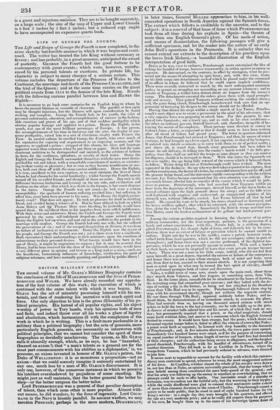LIFE OF GEORGE THE FOURTH.
THE Life and Reign of George the Fourth is now completed, in the same sketchy but forcible manner in which it was begun and conti- nued. The writer has treated the late King without ceremony or favour ; and has probably, in a great measure, anticipated the award of posterity. GEORGE the Fourth had the good -fortune to be contemporary with great events ; which were, however, uninflu- enced by his personal talents or exertions. In private life, his character is subject to many charges of a serious nature. This volume includes the departure of the Princess of Wales to the Continent, the marriage and death of the Princess CH ARLOTTE, and the trial of the Queen; and at the same time carries on the great political events from 1814 to the demise of the late King. It ends with the following curious parallel between him and HENRY the Eighth— It is necessary to go back some centuries for an English king to whom he bears the nearest likeness in ensemble of character. The parallel at first sight may be thought injurious, but the likeness will upon consideration be found i striking and complete. George the Fourth had, n his youth, the &..lat of personal endowment, education, and accomplishment, of success in the fashion- able exercises and graces of his age, and of that reckless prodigality which obtains popular homage and applause in a prince. Henry the Eighth, in his youth, was one of the most brilliant personages of Europe. A fine person, the accomplishments of his tune in literature aud the arts, the display of gor- geous prodigality, raised him to a sort of chivalrous rivalry with Francis the First. In mental culture he excelled George the Fourth, who owes much of his reputation for capacity and acquirement to an imposing manlier, and the eagerness to applaud a prince : stripped of this charm, his ideas and language appeared worse than common when he put them on paper. Both had the same .dominant ambition to be distinguished and imitated, as the arbiters of fashion in dress, for the costliness, splendour, or novelty of their toilet. Henry the Eighth and George the Fourth surrounded themselves with the men most distin- guished for wit and talent, with a remarkable coincidence of motive, as minister- ing to their vanity or pleasures ; but as soon as they became troublesome or use- less, both cast them off with the same careless indifference. Henry the Eighth, it is true, sacrificed to his own caprices, or to court intrigue, the lives of those whom he had chosen for his social familiarity; whilst George the Fourth merely turned off his so-called friends, and thought of them no more, lint such is the difference between barbarism and tyranny on the one side, and civilization and freedom on the other: that which was death in the former, is but court disgrace in the latter. George the Fourth was not cruel—he had even a certain susceptibility : the spectacle of human suffering revolted him ; but suffering, to affect him, must have been present to his sense. Was Henry the Eighth gratui- tously cruel? That does not appear. He took no pleasure thr itself in shedding blood, and avoided being a witness of it. Had he been obliged to look on whilst Anne Boleyn and .§ji. Thomas More were bleeding, he probably would have spared them. He sacrificed them to his impulses from mere selfish indifference. With their wives and mistresses, Henry the Eig.hth and George the Fourth were governed by the same self-indulgent despoosm—the same animal disgust. Henry the Eighth had six wives, and sent one to the scaffold as the prelude to his marriage with another. George the Fourth had only one wife, but she suffered the persecutions of six ; and if she escaped decapitation or divorce, it was from no failure of inclination or instruments. Henry the Eighth was the tyrant of his people, and George the Fourth was not ; yet is there even here a sin; ilk ude. Both surrendered thew understandings to their ministers, upon the condition if subserviency to their personal desires. What George would have been in the age of Henry, it might be ungracious to suppose ; but it may be asserted that henry, had he been reserved for the close of the eighteenth century, would have a very different place in opinion and history as a king and as a mam—such are the beneficent, humanizing influences of knowledge, civilization, the spirit of religious tolerance, and laws mutually guarding and guarded by public liberty!


























 Previous page
Previous page